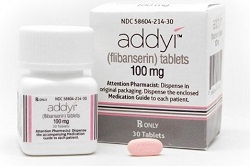Valeant Pharmaceuticals ($VRX) now has a reputation for buying drugs and jacking up their prices. But the company has also taken a flyer on a couple of products that were--and are--risky propositions. One of them was Dendreon's Provenge, the prostate cancer vaccine that stumbled at launch and fell so far short of sales projections that its maker went into bankruptcy.
The other: Addyi, the female libido drug developed by Sprout Pharmaceuticals, twice rejected by the FDA and abandoned by Boehringer Ingelheim before a public lobbying campaign helped push it onto the market last month. Valeant dropped $1 billion to buy Sprout soon after the drug's FDA approval.
That bet isn't working out as planned, at least so far.
 As Bloomberg reports, the number of Addyi scripts has reached a grand total of 227 after its first few weeks on the market. Compare that, as the news service does, to Viagra's half a million for its first month after launch.
As Bloomberg reports, the number of Addyi scripts has reached a grand total of 227 after its first few weeks on the market. Compare that, as the news service does, to Viagra's half a million for its first month after launch.
To hear Addyi advocates talk, women had been waiting impatiently for a drug like it to win FDA approval. That doesn't appear to be so--perhaps because Addyi isn't that great a drug. Its efficacy was marginal compared with placebo, and the risk of serious side effects was great enough to require the FDA's most serious warning, a so-called black box discussion of its risks. The FDA also took the unusual step of barring DTC ads for the med for a year after launch.
Women were cautioned to avoid alcohol to minimize the side effects--a deal breaker for some. And its effects aren't immediately obvious, unlike Viagra's undeniably evident results.
The FDA used another risk-minimization tactic as well: requiring a risk-management program on the drug, which requires doctors to be certified to prescribe it, and prescript education for potential users. And to be fair, plenty of drugs have been slow to gain momentum, particularly when certification paperwork and doctor training is involved. On its Q3 earnings call, Valeant said about 5,600 doctors have completed that process, only about one-sixth of U.S. OB-GYNs, Bloomberg points out, and a tiny fraction of primary-care docs.
Addyi also is specifically approved only for premenopausal women with a particular diagnosis--hypoactive sexual desire disorder--which is a narrow indication. That's its own challenge.
But perhaps the most worrisome development for Valeant is an apparent lack of interest from women, despite the intense media attention on the lobbying for approval and the FDA nod itself. "I thought there was going to be this huge onslaught," Stephanie Faubion, director of the Women's Health Clinic at the Mayo Clinic, told Bloomberg. "There have been a few casual inquiries, but no prescriptions yet."
The script numbers Bloomberg quotes cover the weeks between Oct. 17 and Nov. 6, so it's early days yet. Sprout has 150 reps touting the med, as well as a payer-oriented team.
- see the Bloomberg story
Special Report: Pharma's top 10 M&A deals of 2014